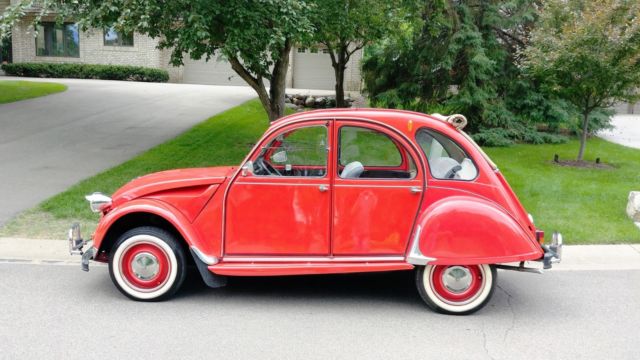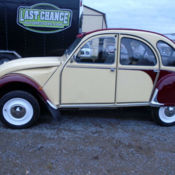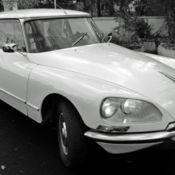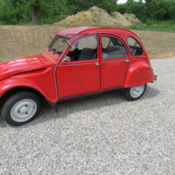This 1973 Citroen 2CV6 (VIN: 9081845) has just recently become available after the passing of a long time enthusiast owner. Comes in excellent running condition with spare parts, manuals/books, portawall whitewall tire covers, and the extra options such as headlight visors, running boards, etc. It's a fun retro vehicle that will get you noticed anywhere you go. Whether it's in front of your business, a summer car show, weekend beach trip, or even at the gas station, people will always stop, wave, and ask what it is!
The Citroën 2CV (French: "deux chevaux" i.e. "deux chevaux-vapeur" (lit. "two steam horses", "two tax horsepower") is an air-cooled front-engine, front-wheel-drive economy car introduced at the 1948 Paris Mondial de l'Automobile and manufactured by Citroën for model years 1948–1990. Conceived by Citroën Vice-President Pierre Boulanger to help motorise the large number of farmers still using horses and carts in 1930s France, the 2CV has a combination of innovative engineering and utilitarian, straightforward metal bodywork — initially corrugated for added strength without added weight. The 2CV featured low cost; simplicity of overall maintenance; an easily serviced air-cooled engine (originally offering 9 hp); low fuel consumption; and an extremely long-travel suspension offering a soft ride and light off-road capability. Often called "an umbrella on wheels", the fixed-profile convertible bodywork featured a full-width, canvas, roll-back sunroof, which accommodated oversized loads and until 1955 reached almost to the car's rear bumper. Notably, Michelin introduced and first commercialized the radial tyre with the introduction of the 2CV.
The body was constructed of a dual H-frame platform chassis and aircraft-style tube framework, and a very thin steel shell that was bolted to the chassis. Because the original design brief called for a low speed car, little or no attention was paid to aerodynamics; the body had a drag coefficient of Cd=0.51, high by today's standards but typical for the era.
The 2CV used the fixed-profile convertible, where the doors and upper side elements of its bodywork remain fixed, while its fabric soft top can be opened. This reduces weight and lowers the centre of gravity, and allows the carrying of long or irregularly shaped items, but the key reason was that fabric was cheaper than steel which was in short supply and expensive after the war. The fixed-profile concept was quite popular in this period.
The engine was designed by Walter Becchia and Lucien Gerard, with a nod to the classic BMW boxer motorcycle engine. It was an air-cooled, flat-twin, four-stroke, 375 cc engine with pushrod operated overhead valves and a hemispherical combustion chamber. The earliest model developed 9 PS (6.6 kW) DIN (6.5 kW). A 425 cc engine was introduced in 1955, followed in 1968 by a 602 cc one giving 28 bhp (21 kW) at 7000 rpm. With the 602 cc engine, the tax classification of the car changed so that it became a 3CV, but the name remained unchanged. A 435 cc engine was introduced at the same time to replace the 425 cc; the 435 cc engine car was named 2CV 4 while the 602 cc took the name 2CV 6 (a variant in Argentina took the name 3CV). The 602 cc engine evolved to the M28 33 bhp (25 kW) in 1970; this was the most powerful engine fitted to the 2CV. A new 602 cc giving 29 bhp (22 kW) at a slower 5,750 rpm was introduced in 1979. This engine was less powerful, and more efficient, allowing lower fuel consumption and better top speed, at the price of decreased acceleration. All 2CVs with the M28 engine can run on unleaded petrol.
Please inquire if you need any additional information.
Preferred Payment: Wire Transfer or Cashiers Check. Please inquiry about other forms of payment.
We do our best to accurately describe the vehicle to the best of our abilities. Any descriptions or representations are for identification purposes only and are NOT to be construed as a warranty of any type. It is the responsibility of the BUYER to have thoroughly inspected the vehicle, and to have satisfied himself or herself as to the condition and value and to bid based upon that judgement solely. The SELLER shall and will make every reasonable effort to disclose any known defects associated with this vehicle at the buyer's request prior to the close of sale. The BUYER is responsible for any/all shipment costs involved in transportation of the vehicle. References for shippers are available upon request.
Email or Call with any question you may have. (Please see below for contact info.)

















